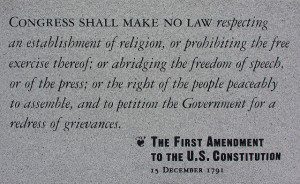 The hearings for Judge Neil Gorsuch’s nomination to the Supreme Court got started.
The hearings for Judge Neil Gorsuch’s nomination to the Supreme Court got started.
Judge Gorsuch is so clearly qualified that it’s hard to see the basis the left will use to try to shoot down his nomination. Evidently, the criticism will be that he rules too frequently in favor of religious liberty. For example, he ruled in the Hobby Lobby case that the owner’s religious convictions outweigh the Obamacare mandate that female employees should be given free birth control.
Today the key assaults on religious liberty are being made in the name of other rights that are assumed to be equal to, or to outweigh the protections of the First Amendment. Thus, the right of a customer to buy a cake for a gay wedding is often thought to deserve more consideration than the Christian baker’s qualms about participating in a ceremony that violates his or her religious convictions.
David French, a constitutional lawyer among his other talents, explains why ‘fundamental rights”–that is, inalienable rights specifically listed in the constitution–must always take priority over subsidiary rights granted by government power.
Thus religious liberty has to trump (sorry) the right to buy a wedding cake from the baker of your choice, or the right to free birth control, or the right of an atheist to hold office in a religious group, etc.
From David French, Neil Gorsuch & Religious Liberty, a Human & Constitutional Right | National Review:
. . .A number of legal leftists believe that Judge Gorsuch has entirely too much respect for religious freedom. Writing in Slate, Dahlia Lithwick lays out this view at length. First, she claims that “our current religious liberty jurisprudence . . . is extremely deferential toward religious believers.” She claims that “religious dissenters who seek to be exempted from neutral and generally applicable laws are given the benefit of the doubt, even when others are harmed. Sometimes those harms are not even taken into account.” . . . .
In other words, when Judge Gorsuch examines the religious-liberty claims of, say, Hobby Lobby against the regulatory “right” of free contraceptive coverage, applying any preference to the claims of religious litigants is not only improper, but it may even violate the establishment clause. . . .
No one should think that all rights exist on equal footing. As our Declaration of Independence acknowledges, we are endowed by our Creator with certain “unalienable rights.” Government doesn’t create those rights. Its role is instead to acknowledge and protect them.
While there’s no comprehensive list of unalienable rights, the Bill of Rights is a good place to start. It defines and protects the liberties that were essential to our nation’s founding and indispensable to the protection of a free people. The Founders appropriately resolved the conflict between fundamental rights and government power. In all but the most compelling circumstances, fundamental rights should prevail.
A “right” to free birth-control pills is not on that list. Nor are numerous other statutory or regulatory rights that governments give and take away at will. In reality, we often use the word “right” to describe what are actually privileges, and it’s entirely appropriate for a court to give deference to an actual human, natural, and constitutional right when it conflicts with a regulatory privilege.
You’ll often see religious-liberty cases wrongly described as if equal rights were in conflict. For example, on college campuses, I’ve litigated cases in which the religious liberty of a student group is said to be in conflict with the “right” of an atheist student to run a Christian group. In other cases, the religious-liberty rights of bakers and florists are said to be in conflict with the alleged “rights” of customers to purchase wedding cakes and floral arrangements from the artist of their choice.
Should rights of conscience be on the same footing as acts of college administrators or state regulators? Or should rights of conscience have a built-in advantage, to be overruled only in the most compelling circumstances?
[Keep reading. . .]
Photo by Ed Uthman, The First Amendment, Flickr, Creative Commons License
 The hearings for Judge Neil Gorsuch’s nomination to the Supreme Court got started.
The hearings for Judge Neil Gorsuch’s nomination to the Supreme Court got started.














